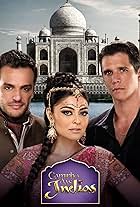IMDb RATING
8.4/10
702
YOUR RATING
The greatest civil war Brazil ever faced by the point of view of the seven women of the separatist leader's family.The greatest civil war Brazil ever faced by the point of view of the seven women of the separatist leader's family.The greatest civil war Brazil ever faced by the point of view of the seven women of the separatist leader's family.
- Awards
- 14 wins & 22 nominations
Browse episodes
Storyline
Did you know
- Trivia'Daniela Escober' (Perpetua) is married to the director of this series, Jayme Monjardim.
Featured review
For those who enjoy a soap opera, Brazil is fertile ground, as the overwhelming majority of general TV channels in the country transmit, on average, four soap operas daily. Invariably, much of this material eventually goes around the world, being bought and broadcast in other countries. One of the most permeable markets for Brazilian teledramaturgy is, of course, my country, due to its cultural and linguistic proximity. I watched this dramatic mini- series twice. The first was at the premiere in Portugal in 2003, and the second was about six years ago, when it was reprised.
The plot runs entirely during the so-called Ragamuffin War, which was a dramatic historical event in which, during the years following Brazil's independence, the southern provinces of the Brazilian Empire attempted to separate and form a new country, the Republic of Rio Grande do Sul, with capital in the city of Porto Alegre. This conflict lasted ten years and had profound political repercussions for Brazil, being itself a direct consequence of the Brazilian defeat in Cisplatine War, which resulted in the independence of Uruguay. In fact, even today the affected Brazilian states (Rio Grande do Sul and Santa Catarina) feel different from the rest of the country, and sometimes the subject of independence is discussed again in the region. In this mini-series, the events are observed in the eyes of the seven women of the family of Bento Gonçalves, leader of the rebels, who watch everything while confined to their country house, a cattle ranch where, often, the rebellious troops camped.
About the cast, I highlight the good performance of Giovanna Antonelli, Camila Morgado, Daniela Escobar, Mariana Ximenes, Eliane Giardini, Bete Mendes, Samara Felippo and Ana Beatriz Nogueira. On the male side, I really liked Werner Schünemann, Luís Melo, Tarcísio Filho, Murilo Rosa and José de Abreu. I confess that I didn't like the performance of Thiago Lacerda, either by the Republican idealism of his character, the Italian fighter Garibaldi, or by the terrible Italian accent he kept. I also didn't like Marcello Novaes, Thiago Fragoso and Bruno Gagliasso, who received bad and poorly constructed characters.
Overall, however, this series is good and deserves to be seen because it will certainly be pleasant, as well as being a good opportunity to think about a painful moment in Brazilian history... perhaps the moment when Brazil was closer to, really, know what a real civil war is.
The plot runs entirely during the so-called Ragamuffin War, which was a dramatic historical event in which, during the years following Brazil's independence, the southern provinces of the Brazilian Empire attempted to separate and form a new country, the Republic of Rio Grande do Sul, with capital in the city of Porto Alegre. This conflict lasted ten years and had profound political repercussions for Brazil, being itself a direct consequence of the Brazilian defeat in Cisplatine War, which resulted in the independence of Uruguay. In fact, even today the affected Brazilian states (Rio Grande do Sul and Santa Catarina) feel different from the rest of the country, and sometimes the subject of independence is discussed again in the region. In this mini-series, the events are observed in the eyes of the seven women of the family of Bento Gonçalves, leader of the rebels, who watch everything while confined to their country house, a cattle ranch where, often, the rebellious troops camped.
About the cast, I highlight the good performance of Giovanna Antonelli, Camila Morgado, Daniela Escobar, Mariana Ximenes, Eliane Giardini, Bete Mendes, Samara Felippo and Ana Beatriz Nogueira. On the male side, I really liked Werner Schünemann, Luís Melo, Tarcísio Filho, Murilo Rosa and José de Abreu. I confess that I didn't like the performance of Thiago Lacerda, either by the Republican idealism of his character, the Italian fighter Garibaldi, or by the terrible Italian accent he kept. I also didn't like Marcello Novaes, Thiago Fragoso and Bruno Gagliasso, who received bad and poorly constructed characters.
Overall, however, this series is good and deserves to be seen because it will certainly be pleasant, as well as being a good opportunity to think about a painful moment in Brazilian history... perhaps the moment when Brazil was closer to, really, know what a real civil war is.
- filipemanuelneto
- Dec 8, 2017
- Permalink
Details
Contribute to this page
Suggest an edit or add missing content

































